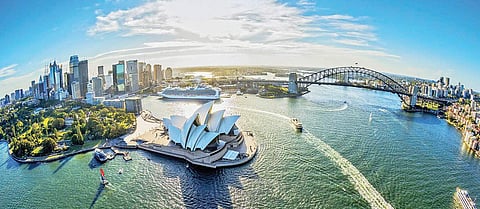

For long my understanding of Australia was based on cricket. My childhood recall is of such Aussie greats as Richie Benaud, Bill Lawry and Bobby Simpson, the heroes of the 60’s when cricket first caught my passion. I must admit though that even as an analyst in my post-army avatar the focus has rarely been towards that part of the world. At least until now, when I finally visited the island continent-cum-nation. Melbourne and Sydney were the cities I recently toured on work-cum-leisure.
Beyond fascinating drives to the Great Ocean Route in Victoria and the Blue Mountains in New South Wales, the mind was in a state of turbulence. A couple of personal observations are in order before one attempts to give a take on some aspects of India’s relationship with Australia.
It is easy to feel welcome in Australia. From the taxi driver, to the hotel janitor and restaurant waiter or going much up the ladder, there appears a natural friendliness. Good infrastructure with everything working like clockwork greets you everywhere. Any and everyone I approached for assistance did his or her bit with a smile. The one thing which cannot escape the eye is the omnipresence of the Chinese. While many could be Vietnamese or even Indonesians, yet the tourist sector quite evidently was simply taken over by China.
Chinese influence and soft power is abundant in presence. As per available figures, annual Australian exports to China amount to 60 billion USD and imports 44.2 billion USD making China the most important trade partner. In comparison, figures for trade with India are eight billion USD exports and 3.25 billion USD imports. As a country with a huge land mass and vast natural resources, Australia’s potential for trade with industrialised countries remains extremely positive. Yet somehow the country is beset with choices in terms of partnerships and these choices aren’t all easy.
With its strategic location straddling the South and North Pacific Ocean, it has hundreds of island territories as its neighbours. Even after the Cold War, its geostrategic location makes it the natural partner-cum-custodian of security in the region. For the US, prevention of activity inimical to their joint interests in the Pacific flank is essential which makes it a strategic partner of the US.
What’s with India? As members of the Commonwealth of Nations, following the principles of democracy there is much convergence of interest. Yet in 1998 when India went overtly nuclear, Australia’s response was the most negative. India’s Defence Attache was packed off overnight and all military relations were cut off. While there was a gradual restoration of goodwill, somehow the actions by the Australian government have stayed in Indian memory longer.
While a 4,00,000 Indian diaspora enjoys the benefits of Australia’s opportunities, it has the potential to leverage its interests in the Indian economic growth which is estimated to grow to 38 trillion USD by 2040. Yet for all the evident goodwill on the surface, there are reports that India has once again denied Australia an invitation to participate in Malabar, its annual naval exercise being conducted this year with the US and Japanese navies.
There are perceptions that this is being done to ease tensions with China. The much-touted Quad of Nations trans-Indo-Pacific partnership, which comprises the US, India, Japan and Australia, does not appear to have fructified to levels of confidence where military exercises with participation by all four can be conducted.
In my discussions with Australian veterans I ventured to ask why Australia would want to be a member of a partnership which could be inimical to Chinese interests. I hastened to inquire whether it was due to the compulsions of Australian-US relationship. I did not get any answer of worth. For now I prefer to think of the next Indo-Australia cricket series to be played in Australia where hopefully the bouncers will be better tackled than the tricky issues of foreign policy.
Lt Gen (retd) Syed Ata Hasnain
Former Commander, Srinagar-based 15 Corps
atahasnain@gmail.com